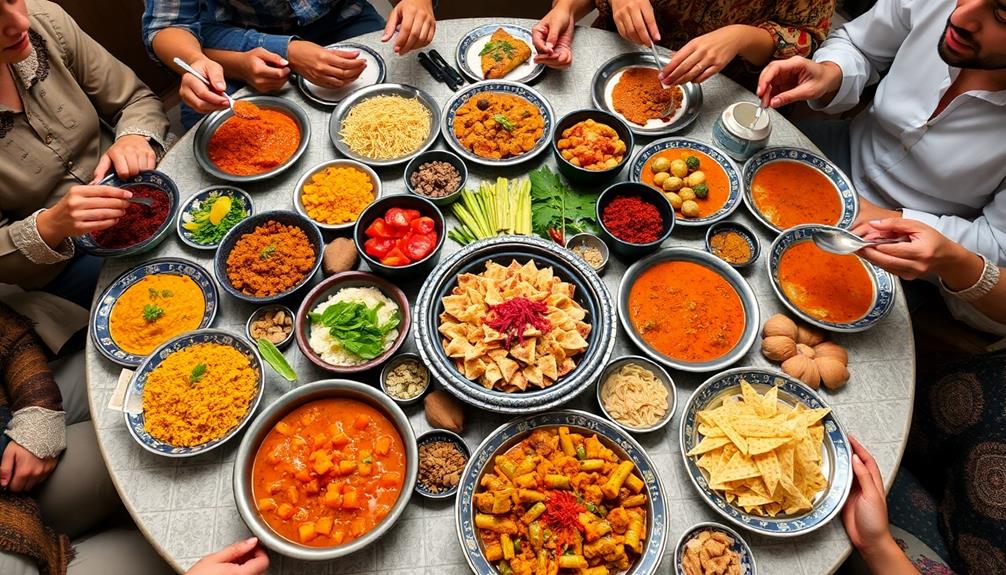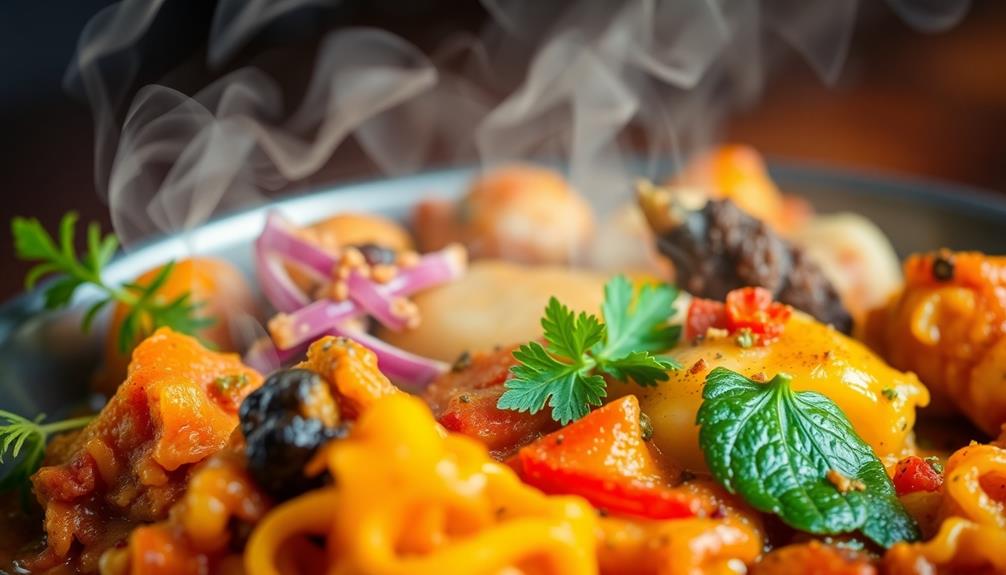Some foods evoke stronger emotional responses due to their sensory qualities, like taste and aroma, that create memorable experiences. For instance, sweet scents can remind you of family gatherings, while textures can influence how you feel about what you eat. Additionally, cultural significance and personal memories tied to food deepen emotional connections. Comfort foods, often linked to nostalgia, provide solace, especially during tough times. The psychological aspects also play a role, as familiar flavors promote happiness. If you're curious about how these elements intertwine, you might find it interesting to explore further insights on the topic.
Key Takeaways
- Sensory attributes like taste, aroma, and texture influence emotional experiences, making certain foods more evocative than others.
- Cultural significance attached to specific foods can deepen emotional connections, enhancing the overall response.
- Nostalgic memories tied to familiar dishes can trigger powerful emotional responses and reinforce cultural identity.
- Comfort foods often provide solace and warmth, leading to heightened emotional reactions during stressful times.
- Personal experiences and shared meals shape individual preferences, making certain foods resonate more emotionally due to their historical context.
Sensory Attributes of Food

The sensory attributes of food play an essential role in shaping your emotional experiences. Taste, aroma, texture, and visual presentation directly influence your emotional responses during food consumption. When you encounter appealing flavors and pleasant aromas, such as the rich and diverse flavors found in traditional Brazilian dishes, they often evoke positive emotions, creating memorable experiences.
Foods that hold cultural significance or trigger strong memories can elicit even more intense emotional reactions. This highlights the interplay between memory and sensory perception, as the experience of eating becomes intertwined with the feelings those foods invoke.
Additionally, the visual presentation of a dish can enhance your emotional response; vibrant colors and appealing arrangements make you more likely to feel excited about a meal.
Texture also plays a vital role—smooth, creamy foods tend to elicit positive feelings, while unpleasant textures can lead to negative reactions. The context in which you consume food, including ambiance and sound, further shapes your perceptions and experiences, amplifying the emotional impact.
Notably, cultural studies reveal that individualist cultures often prioritize sensory attributes like taste and appearance, while collectivist cultures may place more value on communal eating experiences. Understanding these dynamics can help you appreciate the complex relationship between food and emotions.
Cultural Influences on Food Emotion

While enjoying a meal, you mightn't realize how deeply cultural influences shape your emotional responses to food. Each culture attaches unique meanings to specific foods, impacting your food-related emotions and consumer preferences. For instance, traditional Japanese sweets like Dorayaki (Red Bean Pancake) evoke feelings of nostalgia and comfort for many, reflecting the cultural importance of food in forming emotional bonds.
In individualist cultures, personal taste often takes precedence, leading you to prioritize individual preferences in your choices. Conversely, collectivist cultures emphasize shared experiences and communal eating, heightening the emotional weight of food during gatherings.
Sensory experiences, including soundscapes, also play a vital role. Pleasant or unpleasant auditory stimuli can alter flavor perception, highlighting how cultural context influences your emotional responses. Cross-cultural studies reveal that emotional profiles of food vary markedly, meaning you might react differently to the same dish based on your cultural upbringing.
Understanding these cultural influences can enhance marketing strategies. Brands that align their messaging with cultural values can better engage consumers emotionally, ultimately influencing purchasing decisions.
Personal Experiences and Memories

Think back to a dish that instantly takes you back to a cherished moment, like grandma's cookies on a snowy day.
Foods like Muamba De Galinha or a sweet Mandazi can evoke similar feelings of nostalgia and connection to cultural heritage.
Those nostalgic culinary experiences shape not just your taste buds but also your identity and cultural connections.
Each bite can reveal a flood of emotions tied to family traditions and shared celebrations.
Nostalgic Culinary Experiences
Food has a remarkable ability to transport you back in time, conjuring up vivid memories tied to family gatherings and cherished moments from childhood. When you bite into familiar foods, like wild strawberries or currants, the taste and texture can trigger powerful emotional responses.
These nostalgic culinary experiences not only evoke memories but also reinforce your connections to family traditions and cultural heritage. Dishes like Chilaquiles or Tamales often remind individuals of family celebrations and special occasions, further enhancing the emotional depth associated with food.
You might find yourself reminiscing about summer picnics or family holidays, recalling the laughter and love shared over meals. These Proustian moments highlight how sensory experiences shape your personal identity. The emotions tied to these food memories markedly influence your consumer preferences, often more than simple liking ratings would suggest.
As you continue to engage with these nostalgic foods, perhaps by bringing beloved berries back from travels, you're expressing a deep desire to maintain cultural connections and familial ties across generations.
The familiarity of these culinary experiences anchors you in your past, reminding you of who you're and where you come from. Ultimately, food serves as a bridge between your present and your cherished memories.
Cultural Significance of Foods
Memories tied to specific foods often reflect the rich cultural significance they hold in our lives. Think about those dishes that evoke strong emotional responses, often linked to shared family traditions.
When you smell grandma's apple pie baking, it's not just about the flavor; it's about nostalgia, the warmth of familial gatherings, and the laughter around the dinner table. Traditional Ethiopian foods, such as Yekolo (Roasted Barley), can similarly stir powerful emotions, connecting individuals to their heritage and shared experiences.
Your personal experiences shape how you connect with traditional foods, amplifying their emotional impact. The taste of wild berries might remind you of summer days spent picking them with loved ones, creating lasting memories. In positive environments, where love and joy are abundant, these foods take on even greater meaning, enriching your connections to them.
Many traditional dishes carry historical significance, often steeped in familial stories passed down through generations. Each bite can transport you back to pivotal moments in your life, reinforcing the bond between food and emotion.
The Role of Flavor and Aroma

When you think about your favorite foods, the flavor and aroma play a huge role in how they make you feel.
For instance, the sweet scent of Kue Putu being steamed can evoke memories of family gatherings and celebrations.
Pleasant flavors can spark joy and satisfaction, while familiar scents might trigger warm memories.
Together, they create a powerful emotional connection that shapes your overall experience with food.
Flavor Profile Impact
A rich flavor profile can deeply influence your emotional experience with a meal. The distinct taste characteristics of different foods often elicit varying emotional responses. For instance, sweet and savory flavors typically bring about positive emotions like happiness and contentment, while bitter or sour tastes can trigger negative emotions such as disgust or aversion.
Dishes like bulgogi with their sweet and savory marinade can evoke feelings of warmth and nostalgia, often reminding people of family gatherings and celebrations.
Aroma plays an essential role in shaping this flavor experience. Studies show that the scent of food can evoke memories and emotions even before you take a bite, enhancing your emotional engagement. Familiar flavors, those that remind you of home or special occasions, tend to elicit stronger positive emotional responses.
When you encounter these comforting tastes, you're likely to feel a wave of nostalgia and joy.
Moreover, the interplay between flavors and aromas creates multisensory interactions that can greatly influence your consumer responses. If a new food product combines familiar flavors with appealing aromas, you might be more willing to try it.
Ultimately, understanding how flavor profiles impact your emotions can help you choose foods that not only satisfy your palate but also enrich your emotional well-being.
Aroma's Emotional Connection
There's no denying that aroma plays an essential role in your emotional connection to food. Pleasant scents can evoke strong emotional responses, making you more willing to indulge in certain food products. The interplay of flavor and aroma deepens your flavor experiences, creating lasting memories tied to specific scents.
For instance, the rich spices in dishes like Mushroom Masala can transport you to a place of comfort and warmth, evoking feelings of home and nostalgia.
Consider how different aromas affect you:
- Cultural Variations: Certain aromas may evoke distinct emotions based on cultural backgrounds.
- Sensory Interactions: The crunch of fresh ingredients can enhance your perception of flavor and aroma.
- Marketing Impact: Positive olfactory experiences can boost consumer trust and intent to purchase.
These sensory characteristics not only shape your emotional connections but also influence consumer preferences. Marketers are increasingly leveraging these insights in their strategies, using aroma to create memorable experiences that resonate with you.
By tapping into the power of aroma, companies can foster stronger emotional ties between you and their food products, enhancing your overall enjoyment.
Psychological Factors in Eating

Influencing your food choices, psychological factors play an essential role in how you respond to what you eat. The reputation of a food item can greatly shape the emotional responses you experience. For instance, comfort foods like potatoes with sour milk often evoke feelings of nostalgia and warmth, making them particularly resonant during family gatherings.
When a food has a positive reputation, it often elicits feelings of happiness and satisfaction, making you more likely to consume it. This connection between food reputation and emotions creates a chain effect, where positive feelings can predict your food choices more accurately than simple liking ratings.
Moreover, sensory characteristics and cultural context further influence your emotional responses. Different cultures can evoke unique emotional profiles for similar foods, illustrating how individual and collective influences shape your perceptions.
Your past experiences and personality traits also contribute to how you react emotionally to different foods. A food that resonates with your personal history or aligns with your values can evoke stronger emotional responses, affecting your overall consumer behavior.
Comfort Foods and Emotional Responses

Comfort foods hold a special place in our hearts, often tied to cherished memories and feelings of safety. When you indulge in these familiar dishes, such as a warm squash casserole or a bowl of boiled peanuts, you may experience strong emotional responses that elevate your mood and provide comfort during stressful times.
These foods often evoke positive memories, linking them to nostalgic feelings that enhance your emotional well-being.
- Foods rich in carbohydrates and fats can elevate your mood, reducing anxiety.
- Cultural factors shape your food preferences, making traditional dishes resonate deeply in your personal history.
- During emotional distress, you're more likely to gravitate toward comfort foods due to their positive emotional profiles.
The comforting nature of these meals can trigger physiological reactions, like the release of dopamine, reinforcing your desire to seek them out when times get tough.
This connection underscores how comfort foods not only satisfy hunger but also serve as a source of emotional solace. By recognizing the power of these foods, you can better understand how they impact your emotional responses and enhance your overall well-being.
The Science of Food and Emotion

Food and emotion are deeply intertwined, with numerous studies revealing that our feelings about what we eat can greatly impact our choices and experiences. Emotional responses to food are often shaped by its reputation; when a food has a positive reputation, you're more likely to consume it and feel good about your choice. Conversely, negative emotions can deter you from trying certain foods altogether.
Culinary context plays a critical role here as well. For instance, individualist and collectivist cultures may perceive the same dish differently, affecting your food preference. The sensory characteristics of food—like aroma and flavor—also greatly influence your emotional experiences. Foods with pleasant sensory qualities tend to elicit more positive emotional reactions.
Tools like the EsSense Profile™ help identify the distinct emotional responses consumers associate with various food products, underscoring the importance of emotional marketing. Marketers leverage these insights to create strategies that resonate with you on an emotional level, encouraging you to connect with specific consumer food items.
Ultimately, understanding the science of food and emotion can enhance your overall dining experience and emotional satisfaction.
Frequently Asked Questions
Can Certain Foods Make You More Emotional?
Certain foods can definitely make you more emotional. When you taste something familiar, it often triggers memories or feelings, making you nostalgic or happy. Your connection to different flavors can evoke strong emotional reactions.
How Do Special Foods Evoke Strong Emotions?
Special foods evoke strong emotions because they're tied to your memories, traditions, and cultural experiences. When you enjoy these dishes, their familiar tastes and aromas can transport you back to cherished moments, amplifying your feelings.
What Causes Strong Emotional Responses?
Your heart races when you see a childhood treat; emotions explode like fireworks! Strong emotional responses come from personal connections, cultural influences, and the joy certain experiences evoke, making those moments unforgettable and cherished.
What Does It Mean When Foods Have an Emotional Trigger?
When foods have an emotional trigger, they connect you to memories or feelings, making you more likely to enjoy them. This connection can influence your food choices and enhance your overall eating experience.
Conclusion
Food can hit your emotions like a well-timed song brings back memories. The sensory attributes, cultural influences, and personal experiences all intertwine, creating a tapestry of feelings tied to what you eat. Whether it's the comforting aroma of a home-cooked meal or a favorite childhood snack, each bite can evoke powerful memories and emotions. Understanding these connections can deepen your appreciation for food and enhance your dining experiences, turning meals into cherished moments.









